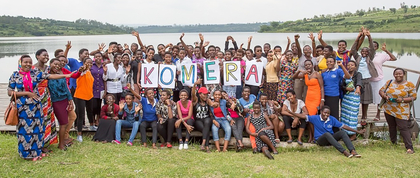
“I am because we are,” stated my savvy driver as we sped past the green, rolling hills of Rwanda, a predominantly Black country in eastern Africa, in July 2023. He was explaining that for many Rwandans, an individual’s identity is woven into the community’s identity. Supporting each individual is critical, because successes and failures are part of the community as well.
This message has long resonated with me: As a graduate student working toward my MPH in the Community Health concentration, I committed to supporting the Black community by founding a student club, called E.X.C.E.L for Healthcare, with the goal of providing health-related programming. And even now, as I pursue my doctorate in health studies and applied educational psychology at Columbia University, I also serve as a junior board member for Komera, the community-based, non-profit organization that brought me to rural Rwanda. It supports female empowerment through education, community development, and health and wellness.
During my visit to Komera I met both current scholars and recent alumnae. The scholars are the top students in the district, and they attend the top schools in the country. They dream of becoming doctors, midwives or scientists who will provide vital resources to their communities. Some alumnae have become entrepreneurs, starting their own businesses in farming, accounting, tailoring, real estate and apiculture -- and all of them are enriching their communities, too.
Komera means “Be strong, have courage,” and the organization encourages those traits in each girl, using a holistic model to provide secondary school and university scholarships, academic materials, career guidance, mentorship, financial literacy, family planning, mental health support, sport-for-change programming and more. This model empowers each scholar to gain advanced education and/or entrepreneurial skills, and to bring those skills and resources back to her community. The scholars are also an inspiration for the next generation, emphasizing the importance of education for girls — a concept that breaks with traditional gender roles.
Each scholar’s parent or guardian also receives vocational skills training and financial literacy lessons, creating a connection that helps them accept education for girls. This is a change from the past, when families sometimes used young girls for income by marrying their daughters off. If the girl refused, it could lead to her being exiled from her family. Komera’s programming teaches families and communities to see and encourage young girls who break social norms simply by pursuing their education and life goals.
Komera scholars have taught me about persevering, and being resourceful and creative as I work to achieve my own goals. I’m inspired to be like these girls from Rwanda; I also want to take the knowledge and skills from my university degrees and sow it back into my community! For these girls, education is the way to improve their own lives and their communities’ livelihoods. In doing so, they encourage me to be who I am within my own community -- which, like Komera, is “strong and courageous.”
Julyssa Jones, MPH ‘21
GPH Alumna, Community Health Science and Practice Concentration